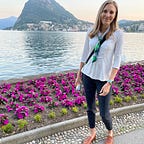“Where Do You Come From?” Is Often a Complex Question
But it no longer keeps me up at night.
When my daughter began Swiss primary school, she entered an integration program that involved several hours of German as a second language instruction in a separate class with other new students. In one of their first activities, the teacher prepared a world map and brought small flags for the children to put on the map to reflect where they had come from.
When asked where she came from, my brown-haired, blue-eyed daughter reflexively responded, ‘Thailand’.
She later told me, ‘My teacher was really surprised. She said she didn’t have a Thai flag but she could print one for me to put on the map next time.’
While our daughter was born in the United States, when she was two years old, we packed six suitcases and headed out on what was supposed to be a two-year foreign posting in Bangkok. We fell in love with the people, the culture and the food and stayed five years.
Somewhere along the way, we embraced the somewhat taxing, yet vibrant, experience of raising our children abroad. So, when our time in Thailand was finished, we chose another posting.
The dissonance my daughter experienced when she told people she was from Thailand and other similar experiences spiraled me into feelings of inadequacy and guilt. I worried my children’s lives would be quilted with feelings of discomfort and alienation. When we visited family in the States, people often commented on their accents and asked what nationality we were.
Sometimes my children admitted to feeling isolated among their cousins because they were not familiar with current American events or pop culture. Yet despite being fluent in German and the local dialect, our temporary status in Switzerland had often relegated them as foreigners.
My worry that they would grow up feeling like outsiders no matter where they chose to live permeated all my thoughts. I personally no longer felt I fit into my old American life but nor was I anywhere near feeling Swiss.
While I had always felt grateful for the opportunity to raise my children surrounded by a diversity of cultures, the weight of worry about the impact of this decision was becoming too heavy for me to carry. I read every book, article, and blog post on Third Culture Kids (children who are raised in a culture different than their parents or their passports). I spent hours pondering the scattered thoughts that rebounded in my brain but failed to find clarity or comfort.
One morning I was out for a run with a friend, unloading all my concerns and fears. Would my children grow up to feel American? Did I want them to? If we stayed in Switzerland would they become Swiss or European? Would this betray my family identity? I was deep into shotgunning questions at my friend when a thought pierced my heart: ‘Does it matter?’
This question silenced me. It bounced around my mind, jarring loose previously held beliefs as we ran along the familiar trail in the woods. And as I pondered the question, the response began to crystallize in my mind: what is important is that they know who they are and this does not need to be defined by nationality. This revelation drastically shifted my thoughts. My concerns did not immediately evaporate but I found clarity as I used the question, ‘Does it matter?’ to sort through my worries and navigate our ex-pat life.
Nationalism as we understand it today is a modern construct. It has been used as a tool to launch armies and incite riots. For every time nationalism brings us together — it also excludes. In many ways, national identity is a distraction from our shared humanity.
Does it matter that my children don’t know the difference between a goal and a touchdown? Or that they have never recited the Pledge of Allegiance? I don’t think so. Their identity is deeper than a box they check or a vote they cast. Does it matter that I don’t make my own Zopf and routinely embarrass them with my rudimentary language skills? I hope not. It’s the benefit of having a good bakery around the corner and fingers crossed it is generating empathy and character.
I don’t know the future. I’m don’t know where we will be living in two years or four or ten. I don’t know where my children will choose to study or live or retire. Nor do I know the identities they will develop for themselves. But I do know that it doesn’t need to be decided today.
Right now, it doesn’t matter.
What does matter, is that we are kind. That we recognize there is good in the world and that we contribute to that good in our own way. We have a sign in our house that reminds us to ‘Grow where you are planted’. To me, this means not only to choose to flourish where you are but also to remember that we are all connected — humanity is global and we can grow together. This is the identity I want to nurture within them. This is what matters.
Now when they are asked where we come from, my children often respond, ‘Planet Earth. And you?’
